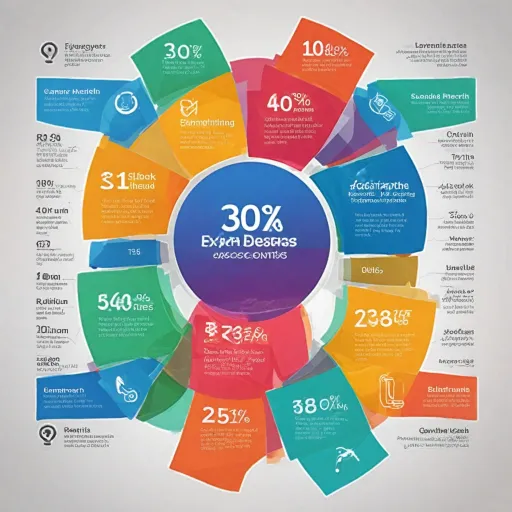
Understanding AI's Role in Managerial Staffing
AI's Influence on Staffing Management
Artificial Intelligence (AI) is reshaping the landscape of managerial staffing, offering innovative solutions to streamline processes and enhance decision-making. In the realm of staffing management, AI tools are becoming indispensable, providing a competitive edge in identifying and placing top-tier talent in management positions. This transformation is not just about efficiency; it's about leveraging technology to make more informed and unbiased decisions.
AI's role in staffing extends beyond simple automation. It involves sophisticated algorithms that analyze vast amounts of data to predict job performance and fit. This capability is particularly beneficial in management staffing, where the stakes are high, and the right choice can significantly impact team dynamics and overall company performance. By integrating AI, organizations can better align their staffing services with long-term goals, ensuring that the right professionals are placed in the right roles.
Moreover, AI helps in refining the recruitment process by providing insights into best practices and workforce solutions. It assists in identifying the skills and attributes that are most likely to succeed in specific management roles. This data-driven approach not only enhances the quality of hires but also supports the development of a more robust and adaptable workforce.
For those interested in understanding the broader implications of AI in HR, exploring the role of a job applicant in AI-powered HR can provide valuable insights into how AI is transforming the hiring landscape.
AI Tools Revolutionizing Recruitment
AI-Powered Recruitment Tools Transforming Talent Acquisition
In today's competitive job market, harnessing artificial intelligence can significantly improve recruitment processes across industries, from manufacturing to finance accounting. AI tools streamline staffing services in a myriad of ways, from scouting talent to onboarding new team members.- Automated Candidate Sourcing: AI software rapidly scans profiles across professional platforms, providing recruiters with a pool of highly-qualified candidates. This automation allows management staffing professionals to focus on more strategic activities rather than manual resume reviews.
- Chatbots for Initial Engagement: Deploying AI-driven chatbots helps maintain engagement with potential employees by addressing their queries promptly. As part of a broader staffing management strategy, this tool ensures that prospective team members feel valued and informed about the recruitment process.
- Predictive Analytics for Hiring Forecasts: By using historical hiring data, AI-powered predictive analytics helps human resources departments anticipate staffing needs. Whether in finance or manufacturing staffing, this insight aids in proactive workforce solutions, ensuring long term employment success.
- AI-Powered Resume Screening: Traditional resume screening is time-consuming and prone to human error or bias. AI systems automatically filter resumes through pre-set criteria, enabling recruiters to spend more time on candidates whose skills align closely with the assigned job requirements.
Improving Candidate Assessment with AI
Revolutionizing Candidate Evaluation with Advanced AI
The process of evaluating candidates for managerial positions has been notably transformed by artificial intelligence. It's no longer just about reviewing resumes or conducting standard interviews. Instead, AI tools provide a multifaceted approach to candidate assessment, enhancing every aspect of the employment process.
AI-powered systems can analyze vast amounts of data from candidates' work history, performance, and online professional presence. This data-driven approach allows staffing management professionals to identify the best candidates not only based on their qualifications but also on their potential to fit within the team dynamics and professional environment.
Moreover, AI facilitates an objective view by mitigating hidden biases that might unknowingly influence traditional hiring processes. By focusing on data and performance metrics, these systems ensure that the recruitment process is as fair and unbiased as possible. As a result, AI can significantly improve the quality of talent acquisition for management positions.
In manufacturing staffing and other sectors with specific technical requirements, AI helps in matching job specifications with candidate skills, providing a more tailored approach to recruitment. For instance, AI tools in staffing services assess candidates' capabilities, ensuring they are ready to work effectively and contribute meaningfully to the assigned job.
In summary, AI not only streamlines the candidate assessment process but also enhances the accuracy and fairness of hiring decisions. By leveraging AI-powered workforce solutions, companies can secure top-tier talent that will help improve their long-term success and operational efficiency.
AI and Bias Mitigation in Hiring
Addressing Bias and Enhancing Fairness in Hiring Practices
Artificial intelligence offers tremendous potential in revolutionizing the hiring process, particularly when it comes to mitigating bias among staffing managers. Traditional recruitment methods have often been criticized for their susceptibility to unconscious bias that can influence employment decisions and negatively impact diversity and inclusion efforts within a team. AI-driven solutions, however, are paving the way for more objective assessments of talent by analyzing large datasets derived from past performances, qualifications, and professional achievements. These systems can be programmed to prioritize skills and experiences while overlooking factors unrelated to job performance. This pooling of extensive data empowers recruiters to focus on the most suitable candidates for managerial positions, ensuring a level playing field across the board. Human resources departments and staffing services are increasingly turning to AI to help safeguard against bias by consistently applying predetermined, data-driven criteria to all candidates. For instance, AI tools enable the analysis of thousands of resumes without the distortions of human prejudice, offering a more equitable recruitment process. In the ever-evolving landscape of managerial staffing, incorporating AI can enhance not only hiring efficiency but also fairness. Nonetheless, the deployment of these advanced technologies is not without its challenges. It is crucial for organizations to continuously monitor and refine AI algorithms to ensure that these tools do not inadvertently perpetuate bias through the datasets they learn from. This highlights the importance of incorporating feedback from diverse team members in the creation and implementation of AI systems. Moreover, gaining the trust of management and employees in AI's capacity to aid staffing decisions remains a top priority. By integrating AI solutions prudently and aligning them with best practices in human resources, companies can leverage technology to enhance the equal opportunity hiring process, leading to a more diverse and effective workforce.Challenges and Ethical Considerations
Addressing Challenges and Ethical Dimensions
Artificial intelligence holds immense promise for revolutionizing staffing management, enhancing efficiency, and streamlining recruitment processes. However, along with its benefits, several challenges and ethical considerations must be addressed to ensure the equitable and effective implementation of AI within the human resources landscape. Various industries, from manufacturing staffing to finance accounting, have integrated AI with the intent to facilitate professional growth and improve the managerial staffing process. Despite the remarkable potential, the human factor in employment requires these AI systems to be designed and used with caution.- Data Privacy: AI systems depend heavily on data derived from candidates and employees. A top-tier concern is ensuring that the data collected for staffing services does not infringe on individual privacy. Organizations need robust data protection measures to prevent misuse and breaches.
- Algorithmic Bias: AI's role in staffing jobs often includes automating the candidate assessment process. However, inherent biases may exist within AI algorithms, which could lead to unfair advantages or discrimination, particularly in hiring for management positions. Ongoing study and refinement are necessary to identify and mitigate such biases, creating a more inclusive staffing approach.
- Transparency and Accountability: Maintaining transparency around AI-driven decisions is crucial. When candidates are evaluated for their readiness to work in assigned jobs through AI, organizations must ensure clarity in how these decisions are made. Providing insights into the algorithms can foster trust among job seekers and team members.
- Economic Implications: While AI can offer efficient solutions for long-term staffing management, there is a need to assess its broader economic impact. Automation might shift job roles, affecting employment rates in human resources and related industries. Stakeholders should engage in discussions about managed services and workforce solutions to balance innovation with job security.
Future Trends in AI for Managerial Staffing
Emerging Innovations and Future Directions in AI for Managerial Staffing
The future of AI in managerial staffing is promising, with continued advancements poised to transform how staffing management is approached. AI-driven solutions offer unparalleled efficiencies in human resources, allowing for seamless matching of talent with managerial positions, thereby enhancing overall team performance. Looking ahead, several trends are shaping this transformative journey:- Adaptive Learning Systems: AI technologies are evolving to adapt to unique organizational requirements, learning from existing processes to improve staffing strategies. By the continuous study of employment patterns, these systems will help tailor recruitment to the long-term needs of the management positions within diverse sectors, including manufacturing staffing and finance accounting.
- Integration with Managed Services: Organizations are increasingly turning to managed services to optimize their staffing services. By integrating AI-driven tools, staffing management can deliver top-tier performance, offering customized workforce solutions that align perfectly with business objectives.
- Enhanced Human-AI Collaborations: As AI becomes more entrenched in staffing services, the role of human oversight will evolve. Professional staffing processes will benefit from a balance between AI accuracy and human intuition, leading to more robust solutions in professional and staffing management.
- Focus on Ethical AI Applications: The ethical considerations surrounding the use of AI will take center stage as organizations strive to mitigate biases inherent in conventional recruiting. By fostering equitable practices, AI will enable fairer processes that enhance team diversity and inclusivity.
- Personalized Career Pathways: With AI's ability to analyze career trajectories, organizations can create personalized pathways for their employees. This approach not only boosts job satisfaction and retention rates but also facilitates the continuous development of managerial talent.













